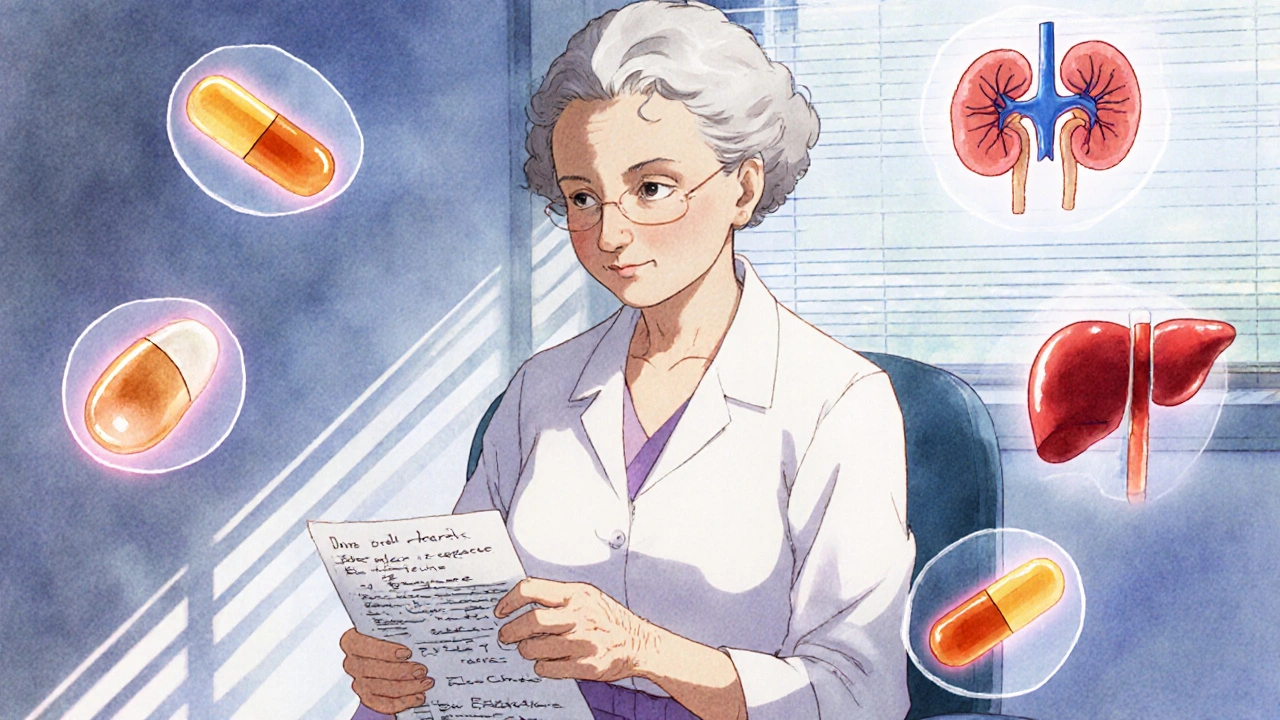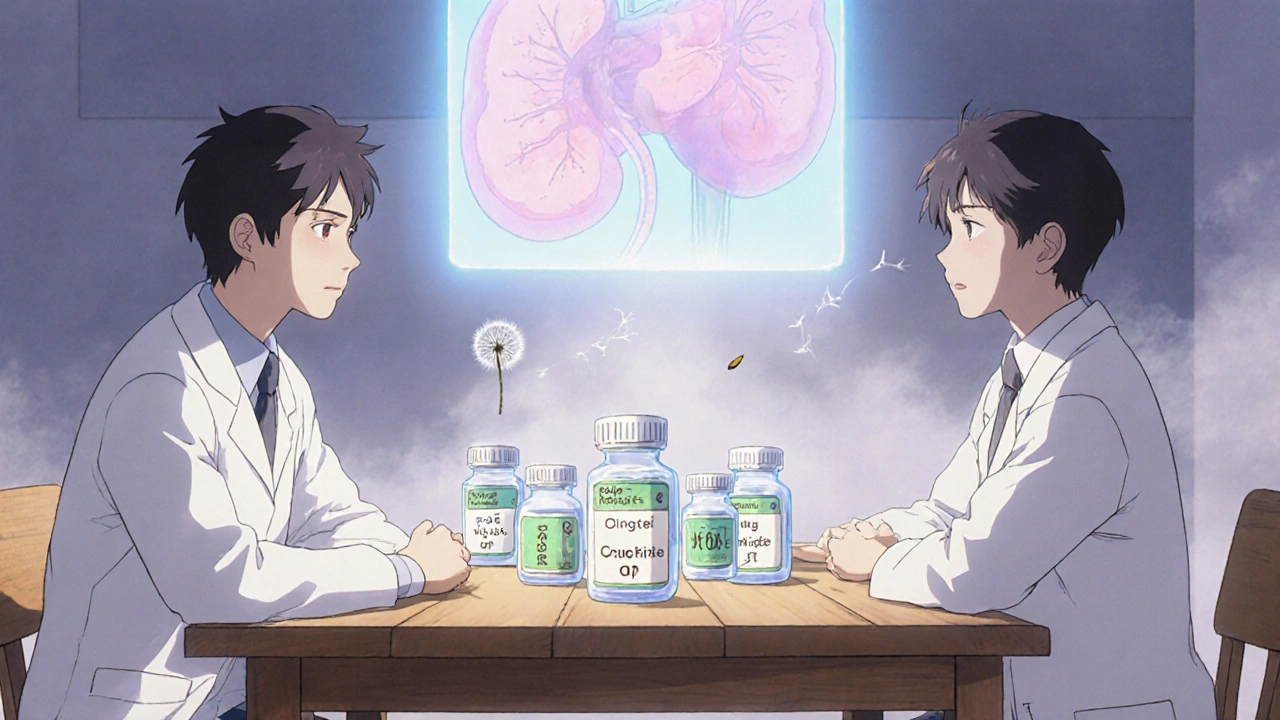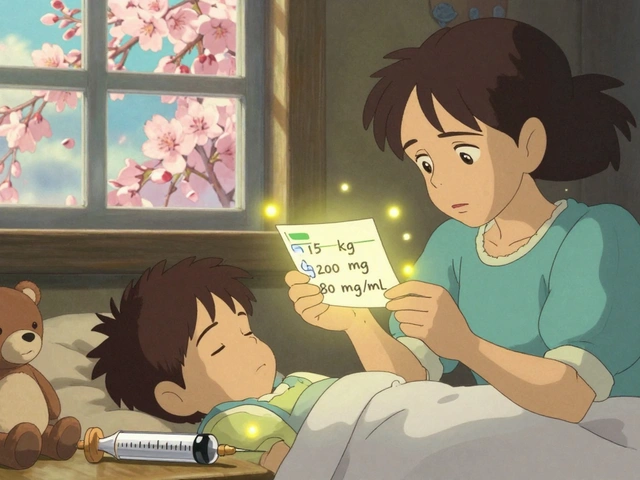
Every pill you take doesn’t just work in isolation. It interacts with your body’s unique story - the diseases you’ve had, the medications you’ve taken, your age, your genetics, even your gender. If you’ve ever been told, "This medicine might cause dizziness," but then felt worse than expected, your medical history is likely the hidden reason why.
Your Past Illnesses Change How Drugs Work in Your Body
Having chronic conditions like kidney disease, liver problems, or heart failure doesn’t just mean you need more treatment - it changes how your body handles every new medication. For example, if your kidneys aren’t filtering properly, drugs that are cleared through urine can build up to dangerous levels. The Merck Manual says patients with chronic kidney disease need dose adjustments for 40% of commonly prescribed drugs. That’s not a small number. It’s the norm.
Same goes for the liver. If you’ve had hepatitis, cirrhosis, or even long-term alcohol use, your liver might not break down medications the way it should. Genetic variations in liver enzymes - like CYP450 - can make drug levels in your blood spike by 30% to 500%. That’s not a typo. A normal dose could become toxic. And most doctors won’t know unless you tell them - or unless your electronic record flags it. But here’s the problem: a 2022 Johns Hopkins study found only 35% of electronic health records properly mark these risks during prescribing.
Polypharmacy Is the Silent Killer
Taking five or more medications at once? You’re not alone. But you’re at serious risk. The British Heart Foundation found that people on five to nine drugs have twice the risk of a bad reaction compared to those on fewer. If you’re on ten or more? Your risk jumps to three times higher.
Why? Because each new drug adds another chance for interaction. It’s not just about two drugs clashing. It’s about how five, seven, or ten drugs affect your liver, kidneys, brain, and heart all at once. The AHRQ says each extra pill increases your chance of a side effect by 7% to 10%. That adds up fast.
And it’s not just about quantity - it’s about what you’re taking. Warfarin and NSAIDs? A dangerous combo for arthritis patients. Together, they cause over 34,000 emergency room visits every year in the U.S. alone. Beta-blockers might mask a heart attack’s warning signs. Steroids can hide the pain of a perforated ulcer. Side effects don’t always look like side effects. Sometimes they look like your old disease coming back.
Age Isn’t Just a Number - It’s a Risk Multiplier
People over 65 are three to five times more likely to have a bad reaction to medication than younger adults. Why? Because aging changes how your body works. Your kidneys slow down. Your liver gets less efficient. Your body holds onto fluids differently. Your brain becomes more sensitive to sedatives and anticholinergics.
And it’s not just physiology. Older adults often see multiple specialists. Each one prescribes something. No one looks at the whole picture. A 2021 JAMA audit showed that 45% of prescribing decisions for seniors ignore declining kidney function - even when lab results are right there in the chart.
On top of that, many older patients take medications inconsistently because of cost. The American Medical Association says 25% of patients skip doses or cut pills to save money. That creates a dangerous cycle: you stop, your condition flares, you restart - but without adjusting the dose. That raises your risk of side effects by 28%.

Your Genetics Might Be Working Against You
You didn’t choose your genes. But they decide how your body reacts to drugs. Some people are fast metabolizers - their bodies clear medication too quickly, making it useless. Others are slow metabolizers - they hold onto drugs too long, leading to toxicity.
For example, the gene CYP2D6 affects how over 25% of common medications are processed, including antidepressants, painkillers, and beta-blockers. If you’re a slow metabolizer and take a standard dose of codeine, you could turn it into morphine too fast - and overdose. That’s not rare. It’s genetic.
Technology exists to test for this. The FDA cleared the YouScript platform in 2023, which checks 27 gene-drug interactions. It can reduce side effects by 34% for people with high-risk variants. But here’s the catch: only 5.7% of U.S. healthcare systems use it. Most doctors still guess.
Gender Matters More Than You Think
Women are 50% more likely to have adverse drug reactions than men - especially after 60. Why? Because most drug trials were done on men. Between 2010 and 2020, only 22% of participants in cardiovascular drug studies were women. So dosing guidelines were built on male biology.
Women have different body fat percentages, hormone levels, and liver enzyme activity. A drug that’s safe for a man might be too strong for a woman. And because women often take more medications - for depression, thyroid issues, osteoporosis - their risk compounds.
Doctors don’t always adjust for this. If you’re a woman and you’ve had unexpected side effects, your medical history might include something the system overlooked: you’re not a man.
One Bad Reaction Can Lead to Another
Have you ever had an allergic reaction to penicillin? That doesn’t just mean you avoid penicillin. It means you’re eight times more likely to react to cephalosporins - a different class of antibiotics that still share similar chemical structures.
This is called cross-reactivity. And it’s not rare. A 2009 study found that patients with a history of one drug reaction have a 30% to 40% higher chance of reacting to similar drugs. Yet most doctors don’t ask about past reactions in detail. They note "allergy to penicillin" - but don’t connect the dots to other drugs in the same family.
And it’s not just allergies. If you had nausea from one antidepressant, you’re more likely to get it from another - even if they’re different brands. Your body remembers.

What You Don’t Tell Your Doctor Matters
Patients on PatientsLikeMe report that 62% of those with three or more chronic conditions have had side effects their doctors didn’t recognize - because they didn’t know about their full medication history. Maybe you took a supplement. Maybe you stopped a drug for a few weeks. Maybe you bought something over the counter.
The Institute for Safe Medication Practices says 23% of preventable hospital admissions happen because medication histories are incomplete or wrong. On average, each patient has 3.2 missing or inaccurate details in their record.
That’s why you need to be your own advocate. Bring a list - not just what you’re taking now, but what you’ve taken in the last year. Include vitamins, herbal teas, painkillers, and even things you stopped because they made you feel weird.
What Can You Do?
There’s hope - but it requires action.
- Keep a written list of every medication, supplement, and over-the-counter drug you’ve taken in the last 12 months - including doses and why you stopped.
- Ask your doctor: "Could any of these be interacting?" and "Could my history make this drug riskier?"
- Request a medication review. A 2023 Cochrane Review found that structured reviews with deprescribing reduce side effects by 22%. Yet only 18% of eligible patients get them.
- If you’re over 65 or on five or more drugs, ask if pharmacogenomic testing is an option - even if it’s not covered yet.
- Never restart a drug you stopped without checking with your doctor. Dose changes matter.
Your medical history isn’t just background information. It’s the blueprint for how your body will respond to every pill you take. Ignoring it isn’t negligence - it’s dangerous. And you’re the only one who holds all the pieces.
Can my past allergies affect new medications I haven’t taken before?
Yes. If you’ve had an allergic reaction to one drug, especially in a specific class like penicillin or sulfa drugs, you’re at higher risk for reactions to similar medications - even ones you’ve never taken. This is called cross-reactivity. For example, a penicillin allergy increases your risk of reacting to cephalosporin antibiotics by up to eight times. Always tell your doctor about any past allergic reactions, even if they happened years ago.
Why do older adults have more side effects from medications?
As we age, our kidneys and liver become less efficient at processing and removing drugs. Our body fat and water balance changes, which affects how medications are absorbed and distributed. Plus, older adults often take multiple medications, increasing the chance of dangerous interactions. Studies show people over 65 experience adverse drug reactions 3 to 5 times more often than younger adults.
Is it true that women are more likely to have bad reactions to drugs?
Yes. Women are at least 50% more likely than men to experience adverse drug reactions, especially after age 60. This is partly because most drug trials historically used male participants, so dosing guidelines were based on male biology. Women have different body composition, hormone levels, and liver enzyme activity, which affects how drugs are processed. This gap in research means women often get doses that are too high for their bodies.
How many medications are too many before side effects become likely?
Taking five or more medications at once doubles your risk of an adverse reaction. If you’re on ten or more, your risk triples. Each additional drug adds about 7-10% more chance of a bad reaction due to interactions, organ stress, or cumulative side effects. This is called polypharmacy, and it’s one of the biggest risk factors for medication harm - especially in older adults.
Can my medical history be wrong in my electronic record?
Yes. Studies show that on average, each patient has 3.2 inaccurate or missing details in their electronic health record - including wrong drug names, incorrect dosages, or forgotten allergies. This leads to 23% of preventable hospital admissions. Always bring your own list of medications to every appointment and ask your doctor to verify it with you.
What’s the best way to reduce my risk of medication side effects?
The most effective step is a structured medication review with your doctor or pharmacist. This involves going through every drug you take - including supplements - to see what’s still necessary and what can be stopped. This process, called deprescribing, has been proven in 14 clinical trials to reduce side effects by 22%. Ask for one if you’re on five or more medications or over 65.
What Comes Next?
If you’re taking multiple medications, especially if you’re over 65 or have chronic conditions, don’t wait for a side effect to happen. Schedule a medication review. Bring your list. Ask the hard questions. If your doctor doesn’t know about your full history - including what you’ve stopped or what you take on your own - they’re flying blind.
And if you’ve ever thought, "This side effect doesn’t make sense," you were right. It probably doesn’t - unless you look at your whole story. Your medical history isn’t just a file. It’s your body’s map. And every pill you take follows it.
15 Comments
Write a comment
More Articles

How to Confirm Pediatric Dosing on a Child’s Prescription Label
Confirming pediatric dosing on a child's prescription label is critical to prevent dangerous medication errors. Learn how to check weight, concentration, and dose in mg/kg to keep your child safe.



Jennifer Walton
November 16, 2025 AT 03:36My grandma took six pills a day. One made her dizzy. Another made her forget her own name. The doctor just said, "It’s aging." No one asked if the list was right. We just kept adding more.